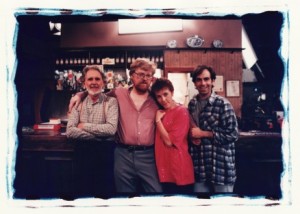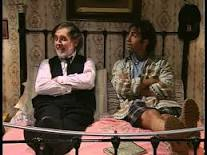I don’t know if anyone ever addresses Lord Hall of Birkenhead, Director General of the BBC, as ‘butt’. I suppose I’m unlikely to find out as he probably has more pressing questions to answer in these days of Charter Renewal debate. Nonetheless the question came to me as I reflected on a blog I wrote yesterday attempting to unpack what Tony Hall meant when he used the word ‘culture’ in a speech in Cardiff in 2014.
there are some aspects of national life in Wales that are not sufficiently captured by the BBC’s own television services in Wales, and I would include comedy, entertainment and culture in those categories
Tony Hall
I don’t want to treat that speech as some gospel to be mined for esoteric meanings and yet light did dawn, and the clue was an in example of one of the genres whose erosion he lamented in that text. He named comedy, entertainment and culture as genres whose production has been eroded, in the last decade, on English language television in Wales. I found myself thinking about a comedy series which, in my view, is one of the best BBC Wales has ever made.

Satellite City began on Radio Wales and moved to three BBC Wales tv series between 1995 and 1999. An American takes lodgings with a Valleys family. He is a chaste, New Age-y idealist who nevertheless trails with him a tiny cloud of New World glamour. He is the catalyst for the expression among his Welsh hosts of repressed longings, relentlessly tamped down by their sardonic realism yet erupting in periodic bursts of passion and desperate action.
The Price family and their neighbours are so very nearly normal but tinged with eccentricity (and occasional inspiration) by the constriction and frustration they experience daily. They love each other and they love where they live despite their torturing awareness of the limitations of people and place.
The American, Randy (and no play is made of the name) shares not only the house but also the bed of the grandfather, Idris, a retired miner. Neither finds this arrangement strange. Idris is in the line of Valleys philosophers, men who found it natural to pursue the life of the mind in the midst of back-breaking toil. Many episodes feature a bedroom scene where Idris and Randy converse between the sheets. Idris sees Randy as attractively sophisticated. Randy tends to expect Idris to be a fount of old-timer wisdom. They muse and speculate at large and in one memorable exchange, touching in what it reveals about Idris’s gentle reaching after enlightenment, the old miner says to the American, “You’re a man of the world. What exactly is scampi, butt?’
And so, inspired, I realised that in trying to understand Tony Hall’s ‘culture’ I hadn’t gone far enough. I had produced a list of the arts but he didn’t say ‘arts’, he said ‘culture’. So What exactly is culture, butt? What is the difference between the arts and culture?
What exactly is culture, butt?
Culture is something more than the arts. An example might be the BBC National Orchestra of Wales. The musicians practise an art but in their engagement with audiences they contribute towards constructing culture. Why? Because something grows from this encounter; something nuanced and both public and private; something which emerges from mutuality.
And Idris and Randy, in their bedtime chats, are engaged in a cultural practice – the search for meaning. What does it all mean? is a subtext throughout the series. Gwynne, Idris’s son, played by the scriptwriter, Boyd Clack has a touch of the Basil Fawlty about him in his rants about the frustrations of his life. But he rants because there is meaning somewhere if only he could find it.

Idris and Randy philosophise unselfconsciously and with dignity. They try out their theories, reach conclusions, express perplexity. Then they bid each other goodnight and switch off the light to get ready to face another day. This was sometimes a poignant moment as one registered the enormity of the task they had set themselves – making sense of their lives. How risible. How noble.
So, when Tony Hall directed our attention to culture it seems to me that he was suggesting this broad area of values, identity and meaning. It’s not genres alone but culture that is being eroded on television in Wales. Unsurprisingly there is not a lot of philosophy on BBC Wales but are the spaces in which we can ask about, as it were, the meaning of scampi, in Wales, contracting like poor Gwynne’s prospects? Idris and Randy had an old-fashioned, high bed for an agora in which to conduct their debates as they attempt to understand themselves. Where is ours? Is the internet providing that kind of space for culture? Should we stop expecting BBC Wales to do entertainment, comedy and culture? And if we do where will the Welsh see themselves?
The Ofcom report Public service broadcasting in the internet age: the Nations of he UK and their regions states that:
In Wales, the absence of a strong indigenous print media is in stark contrast to Scotland and Northern Ireland…Wales is served less comprehensively, outside the BBC, than any of the other UK nations, with weaker print media and commercial radio services offering a reduced challenge to the BBC in terms of a plurality of voices.
There was a 15% decrease in the number of BBC non-network first-run hours of tv in Wales between 2008 and 2014.
Satellite City had something essential to every good comedy – universals rooted in the specific and the local. That’s what viewers in Wales are in danger of seeing diminish: the representation of their lives, their baggage from the past, their turns of phrase, their prejudices revealed (‘They boil yewer ‘ead in Ca’diff!’).
We need to work out what we want from television in Wales. What does it mean for us that culture is being worn away from the English language tv menu?